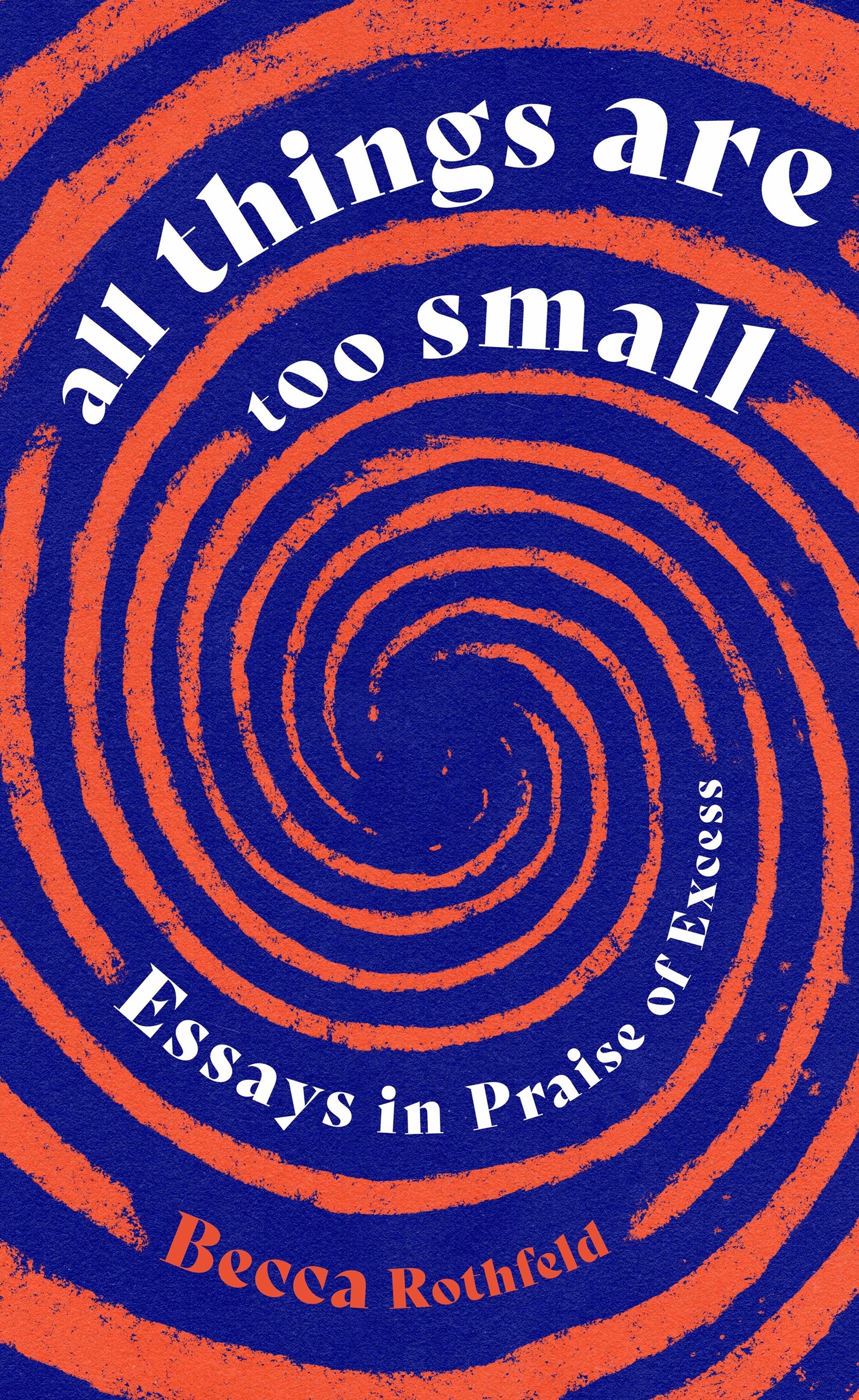The title of Becca Rothfeld’s debut essay collection is inspired by a 13th-century mystic. “All things/are too small/to hold me,” writes Hadewijch of Brabant in a poem that also serves as the collection’s epigraph. In her introduction, Rothfeld elaborates – everything in this world is, in fact, too small. “Cups are too small which is why they demand such relentless refilling,” she writes. “Bodies are too small to encompass more than a single inhabitant.” Rothfeld follows with an anecdote of a man who orders pasta in a restaurant, finishes his plate, and orders it a second time. And then a third time. If only he’d had a plate big enough, she thinks.
All Things Are Too Small: Essays in Praise of Excess is a critical celebration of overabundance, which also analyses the forms and systems that contain us. In More is More Rothfeld takes on decluttering, a late-capitalist minimalism that would turn us into the blankest, most portable of beings, making canny comparisons with contemporary ‘fragment novels’ in which these decluttered subjects seem to live. Other chapters critique the industry of mindfulness (committed to ‘minimising mental messes’) and Sally Rooney’s normal novels. Rothfeld revels, however, in stalking exes, Éric Rohmer’s double lives, and the cinema of David Cronenberg, which, rather than depict a man falling in love, has him turning into a fly. Although a book can only be so long (12 chapters in this case), All Things Are Too Small brims over with opulent sentences that are an indulgence in their own right.
With a background in philosophy (her PhD from Harvard is indefinitely on pause), Rothfeld is a prolific cultural critic. The non-fiction book critic for The Washington Post, she also contributes to publications such as The New Yorker, The Atlantic, Bookforum, The Baffler and more.
Below, Becca Rothfeld speaks to AnOther about reclaiming excess, ‘meaty’ novels and why we need the superfluities of criticism.

Kitty Grady: Today, excess is a bit of a dirty word, with connotations of capitalistic overproduction. Why is it a topic that you wanted to explore now?
Becca Rothfeld: I wanted to recuperate excess from its more capitalistic manifestations. The book is not an apology for mass consumerism, wasting lots of resources or exploiting people and the earth. It’s more of a defence of gratuities in human existence. In fact, it’s a pretty anti-capitalistic book. It’s a defence of the things that we don’t need but want, which includes art and love; things that are not commodities in the usual sense. I felt that excess had a bad name because it wasn’t being appropriately understood or honoured.
A lot of contemporary capitalist aesthetics are minimalist. They’re quite wasteful, but they are not opulent or extravagant. You picture Kim Kardashian’s house and it’s empty and beige. Even though she has so much money, this is where she’s choosing to live. It’s this aesthetic that permeates and that I find unsatisfying.
KG: Was there something that drew you to excess, or was this a topic you had been pursuing subconsciously?
BR: I am just a very maximalist person in my own life. I have lots of books. I live in clutter and chaos which I think is really fruitful and generative for me. I read a lot for my job and for pleasure and I agree with Joyce Carol Oates’s characterisation of so many contemporary novels as “wan little husks.” I really love a grand encyclopaedic novel or a grand cinematic endeavour.
KG: Often when people ask for a novel recommendation they’ll ask for something ‘meaty’ – it’s like feeding an appetite.
BR: A novel you want to eat … Not that there are no great contemporary prose stylists now. Of course there are, but there’s a sumptuousness to Nabokov or Melville’s prose that is conspicuously lacking in trendier contemporary novels. Of course, it’s a stylistic choice. People are choosing to write in this really pared-down way, but it doesn’t feel sustaining or filling. I read a lot of ‘fragment novels’ to research my book and I already barely remember them. They’re all interchangeable. It’s generally a female protagonist who hates her boring job and lives in a major city and has the same points of reference.
“This book is an anti-practicality manifesto. It’s about luxuriating in prose that’s beautiful, even if the prose isn’t conveying an obvious, concrete, useful message” – Becca Rothfeld
KG: In chapters like Ladies in Waiting, you reflect on female experiences. Do you had any wider thoughts on the gendered experience of excess, and whether society treats female excess differently to male excess?
BR: Women are faulted for various sorts of excess more than men and that is a line of critique that runs through the book. A lot of the essays are about the way that women suppress their appetites. But a less obvious answer is that femininity is an exercise in excess. Women are allowed to engage in ornamentation or to delight in frivolities, in beauty and in things that aren’t really for anything else. Whereas masculinity, as traditionally constructed, is really a matter of practicality. And in a way, this book is an anti-practicality manifesto. It’s about luxuriating in prose that’s beautiful, even if the prose isn’t conveying an obvious, concrete, useful message. And in a way that is a province of femininity.
KG: You touched on the frivolity of language there … Do you think the kind of language of criticism is as important as the criticism itself?
BR: The business of criticism is not just to make arguments about the value of books, but is to evoke the experience of reading books. That’s only something that you can do if your language is a delight in its own right. Of course, that’s often hard to accomplish. Writing beautifully is hard, but I do think that is one of the tasks of the critic. It’s not just to convey propositions, but to create a work of literature that is perhaps on par with the books that are being evaluated, if you’re lucky.
KG: There’s a certain paradox in the title of your book, that all things are too small. Is it the role of art to show us what a divine excess might look like?
BR: The book is a protest against forms of minimalism. Maximalism is a revolt against mortality. It’s a revolt against the strictures of life as a human being. You can’t eat everything. You can’t see everything. You can only live one relatively short life.
That’s one of the reasons I’m interested in various religious thinkers. There are lots of mediaeval Catholic mystics who show up in the book: Simone Weil and Catherine of Siena. For all of their starvation and restraint around eating (which is a common theme), they seem gluttonous for more than this world can provide. While I don’t necessarily share their optimism that there is a literal heaven where I can glut myself on delicious food, I do think that art plays a similar role for me. It provides us with at least the intimation of a world fuller than our own.
“A lot of contemporary capitalist aesthetics are minimalist. They’re quite wasteful, but they are not opulent or extravagant” – Becca Rothfeld
KG: I loved your critique of Sally Rooney in Normal Novels. Why, despite their flat, ‘anodyne’ quality, do you think they are so popular?
BR: A big part of it is that [her books] are easy to read. They go down easily. And that’s true of all these fragment novels. Sally Rooney presents the kind of romance novel fantasy that you can be at once unassuming and unpretentious and yet the most special person in the world. You have Marianne, who’s such a dedicated egalitarian, and yet she’s the most beautiful, brilliant girl at the school, even though she doesn’t try at all.
KG: What do you make of the current climate for book criticism?
BR: My unpopular opinion is that we’re in a golden age of criticism. [Although] the material reality of being a professional book critic is bleak, probably worse than it’s been in the past. Everybody is always complaining that criticism is too nice – I don’t think that’s true. I think there are lots of deliciously negative reviews and lots of critics that I’m always excited to read because they are so unfailingly honest. For example, Ann Manov’s viral review of Lauren Oyler recently – there are plenty of pieces like that in circulation. So I am optimistic about the quality of criticism, although the material conditions that support it could obviously be improved.
All Things Are Too Small: Essays in Praise of Excess by Becca Rothfeld is published by Virago, and is out now.
